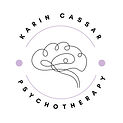What Will My First Therapy Session Be Like?
- Karin Cassar

- Aug 30
- 3 min read
It's common to feel unsure or nervous about your first therapy session, but it's not as scary as you might think. Here's what to expect in your first therapy session.
The first step is often the hardest. Acknowledging that you need support, researching your options, and taking the leap to contact a therapist… All of this takes courage. You may have been thinking about it for weeks, months, or even kept putting it off for years before making the first call or sending that email.
Many people feel an initial sense of relief after making contact, but it’s also completely normal for uncertainty to linger. Questions might start popping up in your head: What now? What happens next? What if I don’t know what to say? What if I cry? What if it doesn’t work?

If these thoughts sound familiar, you’re in good company. Most people feel some level of nervousness before their first therapy session. After all, you’re about to meet someone new and talk about deeply personal matters.
This is where it helps to remember that your therapist is trained to meet people right where they are, even - and especially - in the unknown. Your therapist is there to guide, support, and collaborate with you from the very beginning. It’s okay to feel anxious or unsure of what to expect, it simply means you care about this process.
Setting the Foundation in Therapy
Your first therapy session isn’t about “fixing” anything right away. It’s about creating a safe foundation for the meaningful work ahead. You may eventually go to vulnerable or painful places in your process, so this initial session focuses on building a relationship of trust and mutual understanding.
It’s also an opportunity for you to explore what you’d like to get out of therapy. Your therapist may gently ask questions like:
What brought you here?
What would you like to work on?
What’s been happening in your life recently?
You don’t need to have all the answers. Many people begin therapy unsure of what they want or how they feel, and that’s okay. Therapy is a space where clarity often emerges over time.

A Gestalt Approach
As a Gestalt therapist, I pay close attention not just to what you say, but to how you're experiencing things in the present moment. This might include noticing your body language, pauses in speech, or shifts in emotion. You might be invited to reflect on what you're feeling right now as we talk — not to analyze it, but to become more aware of your experience as it unfolds.
This emphasis on present-moment awareness and relational connection helps us discover patterns, unmet needs, and new possibilities — not just through talking about your life, but through noticing how you’re living it in real-time.
You’re in Charge
Your therapist is there to help you, not to pressure you. You can always choose what to share or hold back. You also have every right to ask your own questions — about the therapy process, the therapist’s training and approach, or anything else you’re curious or unsure about.
The first session usually includes practical details as well: how long sessions are, how often you might meet, fees, cancellation policies, and how confidentiality works (including its limits, such as risk of harm).

After your First Therapy Session
It’s common to leave your first session with more questions than answers. That doesn’t mean anything went wrong — therapy is a process, not a quick solution. If you think of things later, write them down and bring them to your next session.
And finally, remember: you are doing this for you. If something doesn’t feel right — with the therapist or the process — it’s okay to keep exploring until you find the right fit. It may take a few tries, but when you find a therapist who truly resonates with you, the work can be life-changing.





